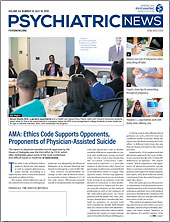Everyone likes a good laugh, but when is humor appropriate in our professional and clinical settings? Telling a joke can create interpersonal warmth and connection, put an anxious patient at ease, and signal that the psychiatrist is friendly and capable of playfulness. On one hand, humor with a patient may soften an interpretation, allowing it to slip past his or her defenses, moving the treatment forward. On the other hand, the patient may misunderstand the joke, causing confusion or hurt feelings. Before venturing into humor with patients or staff, consider both the intention of the teller of the joke and the state of mind of the listener.
Freud conceptualized humor as the highest order of defensive process, an opportunity to express repressed aggressive or sexual energy, bringing pleasure and relief. In more modern terms, a joke can be playful mirroring or a mentalizing opportunity. When a joke is understood by the listener, both the teller and listener share a moment of empathy—placing themselves into the thought process of the other—and deriving pleasure in that meeting of the minds. In these instances, a shared joke with a patient (or even with a co-worker) can break the ice or build a feeling of connection, both of which can be helpful to the treatment or the workplace.
Unfortunately, humor can unintentionally hurt feelings and harm the alliance. A joke is almost always at someone’s expense. Jokes are funny because they contain an element of aggression, often venturing into taboo areas in a way that is socially acceptable. As psychiatrists, we don’t want to direct our aggression, however softened by humor, toward our patients or our co-workers.
Some patients may not understand our humor. People on the autism spectrum in particular may not detect the sarcasm in our voice when we say, “Oh, that was nice of him,” for example, in response to hearing about something inconsiderate someone did to the patient, and then interpret our joke as a statement of fact. Similarly, patients who are anxious, insecure, or paranoid may personalize or distort our attempts at humor and come away with a message other than what we intended.
At other times, the patient may welcome the humor, but that humor could detract from the treatment because it is a defensive process. Humor that eases a tense treatment moment, bringing immediate relief, may be at the expense of an opportunity to focus with the patient and address powerful emotion. In conspiring to avoid the pain in the room with welcome levity, neither psychiatrist nor patient may be conscious of the lost opportunity to go deeper.
Humor with staff is similarly complex. It can make for a happy work environment or it can be offensive. Particular care must be taken to avoid humor that diminishes a group of people based on their identity. Mimicking an accent, naming a specific ethnic or racial group, poking fun at a gender or subset of a gender (for example, blonde jokes, which are sexist), or targeting a political ideology can all be offensive to a listener. Obviously, sexual humor has no place in the workplace; keep it clean and respectful.
In the current social climate, there is inordinate sensitivity to any perceived negative bias. Some may feel this has been taken to such an extreme that no joke is safe from the “PC police.” The flip-side perspective is that historically oppressed groups have been suffering indignities for decades or centuries, and it’s not too much to ask for extra respect and discretion now. Although it may require more care to find inoffensive expressions of humor, this exercise in restraint elevates courtesy and professionalism.
In addition to self-awareness about bias, psychiatrists would do well to examine their intention before telling jokes. In his 1928 paper “Humour,” Freud noted that the intention of the joke is paramount. In the treatment setting, attending to intention alone is insufficient. Consideration of the recipient of the joke is equally necessary to assess both the potential harms and benefits of humor in a particular moment with a particular patient or co-worker.
Psychiatrists must be vigilant in their self-awareness, noticing differences in their behavior with one person compared with others or in one session compared with others and responding to cues from patients or co-workers about the effect of lighthearted departures from the norm. ■

